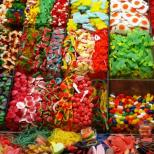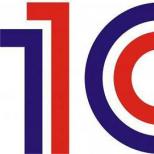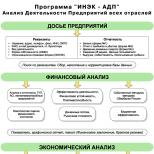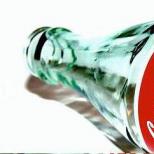Business ideas for a billion dollars: world practice. Billion Dollar Ideas Brad Hughes Automatic Luggage Storage
“To invent something, you need a great imagination and a mountain of garbage,” said Thomas Alva Edison himself, an American inventor, a genius of technological progress.
Edison himself used his imagination to the fullest. He managed to produce a lot of know-how with the help of a "heap of garbage", which turned into useful goods. He developed separate lines of business that did not even exist before him. And today, a modern high-tech society needs more than ever the bold ideas of inventors - these pioneers of progress. And no one wants trash. A visual illustration is a list of ten inventions of the century, with the help of which people managed to get billions of dollars into their accounts.
Half of these inventions dawned on inquisitive Americans, the rest were invented by seekers from other countries of the world - from Germany to Thailand.
1st place - Michel Ferrero and family. Europe. $10 billion
Business idea: make chocolate butter for sandwiches and cakes for breakfast, include liquid and solid chocolate in the menu of every day.
Michel Ferrero, patriarch of a family that is recognized as the largest chocolate producer in Europe. The firm's brands are widely known - Kinder Eggs, Tic Tac and Ferrero Rocher. In the 21st century, the Ferrero family is actively expanding its presence in the Asian market, and especially in China. and especially Chinese markets. The head of the family, Michel, lives permanently in Monte Carlo, and his sons settled in Belgium.
2nd place - Brad Hughes. $5.3 billion
Business idea: for the convenience of travelers, install automatic lockers along the highways.
Brad's Public Storage is America's best-known storage company with over 2,000 storage locations. Company founder Brad Hughes got his start as a senior executive in the Property Research syndicate. His responsibilities included real estate transactions. It was this kind of work that prompted him to create his own company, which did everything necessary in automatic cameras. Today, Hughes is battling childhood leukemia. The special contribution of the billionaire is a donation to the Parker Hughes Cancer Center in St. Paul, where he transferred $ 200 million. This institution was named after his eldest son.
3rd place - Ralph Lauren. $5 billion
Business idea: Stick a bright horse label on a simple men's polo shirt. The quoted price of $50 more than made up for the cost. Then he could just count the profits.
The son of Russian refugees, Ralph Lauren, was born in the Bronx. He began his career as a clerk in a Brooks Brothers store. In 1967, without completing his studies at a business college, he began designing ties for Beau Brummel. Borrowed $50,000, he launched his legendary Polo. And 17 years ago, Ralph, a successful businessman, sold his 28 percent stake for $138 million to Goldman Sachs. Today Lauren is the owner of a rancher in Colorado and a luxurious estate in Jamaica.
4th place - Jeff Bizos. $4.4 billion
Business idea: free book buyers from tedious trips to book sales in search of literature. Sell and buy books online.
Jeff Bizos grew up in Texas. Graduated from university, worked on Wall Street and was a computer designer in Princetown. By the age of 30, he decided to change his life - he began to sell books via the Internet. The company's first modest office was located in Seattle in a small garage. To date, the founder of Amazon.com has become the owner of the largest virtual store. He became a billionaire in 1997. All his life he was fond of space flights.
5th place - Ty Warner. $4.5 billion
Business Idea: Release for sale limited editions of cute, teddy bears with warm, touching names. These toys immediately become collector's items after the sale.
The humble Warner is still embarrassed by the media attention he gets as the owner of the Binnie teddy bear brand. He dropped out of college for his life's work of selling teddy bears. Since 1986, for a quarter of a century now, Binnie bears have been the unchanging leaders in the soft toy market. Profits from the sale of their brands Ty Warner is trying to acquire real estate. It is he who owns the most expensive Four Seasons hotel in New York. To spend the night in the room of this chic establishment costs only 30 thousand dollars.
6th place - Kaleo Yuvidiha, Thailand. Dietrich Mateschitz, Austria. $3.1 billion, $3 billion (respectively)
Business Idea: Sell an energy drink based on sugar and caffeine, which is rich in vitamin B, to athletes and lovers of night parties.
The owners of the famous brand Red Bull, Juvidiha and Mateschitz, have created an energy drink for young people who are passionate about sports and lead an active lifestyle. Every year this drink is sold for more than 3.4 billion dollars. The co-owners of the brand, each owning 49 percent of the company, are expanding their business by acquiring not only a Formula 1 racing team but also two football teams. Their names invariably include the brand logo: New York Red Bulls and Red Bull Salzburg. One of the partners, Yuvidihe, also owns $170 million TC Pharmaceuticals and a network of Thai private clinics. The company manufactures its energy drinks in Thailand. And Mateschitz is more committed to creating business projects related to the development of airlines and aviation.
7th place - Mario Moretti Poligatto. Italy. $3 billion
Business idea: the production of shoes that are designed for people suffering from the smell of sweat on their feet. Special insoles with small holes in the sole help to avoid unpleasant odors.
The founder of Geox shoes built his fortune making shoes that can breathe. Such thoughts came to him during a trip through the mountains of Nevada, in 1994. When it was unbearably hot outside, inventive Mario made holes in the soles of his sneakers, thereby providing his feet with the opportunity to breathe. The first attempt to sell his idea was an offer to Nike. However, she showed no interest in the proposed innovation. To date, the company founded by Mario sells over 16 million pairs of shoes annually. Even the Pope himself is among the clients of Geox shoes. Enjoying the success of his venture, Mario purchased two Lamborghinis, a Ferrari 360 Modena Spider, five Arabian horses and six antique Moto Guzzi motorcycles. All this does not prevent the inventor from making glasses in his spare time.
8th place - James Dyson. Great Britain. $1.6 billion
Business idea: creation of a powerful vacuum cleaner capable of sucking up dust at speeds of 320 km/h or more. This speed allows the dust to be packed tightly and makes it impossible to release it to the outside.
From childhood, James Dyson was a talented young man. He studied English, learned to play the bassoon, studied at art school, studying design and engineering. In 1993, in England, he presented his first vacuum cleaner. Today, there are already 5127 prototypes of this unit. In 2011, the Englishman's vacuum cleaner, namely the DS12 model, became the most popular in Japan, eclipsing even the well-known Japanese brands Sanyo and Sharp.
9th place - Hans and Paul Reigeli, Germany. $1.5 billion (each)
Business idea: Selling sweet chewy candies in a variety of shapes.
Hans and Paul successfully relaunched their family business after World War II by rebuilding a candy factory. Today, their company annually produces two billion turnover. The main occupation of Hans is the development of varieties of manufactured sweets. More than 200 variants have already been developed. Hans gets ideas for creating new forms by watching comics and children's films.
10th - Howard Schultz, $1.1 billion
Business idea: every corner of the house in America should have its own coffee shop.
Howard Schultz grew up in Brooklyn and was educated at Northern Michigan University. After moving to New York, the future coffee king and owner of the Starbucks chain of coffee shops began selling mugs and pots from a well-known Swedish manufacturer of kitchenware. After a trip to Italy, Schultz came up with the idea - to open a chain of bars selling espresso. Having been refused by his bosses, at his own peril and risk, in 1985 he opens his own business. And already in 1992, Howard began public trading in the shares of his company. The Starbucks empire today has 12,000 coffee shops that can serve more than 40 million Americans a week.
Not always a crazy profit from sales means a solid investment at the initial stage. Sometimes start-up capital is replaced by an idea, but so brilliant that someone richer is ready to give any money for permission to implement it.
In this article, Bright Side presents inventions and business solutions that brought fabulous wealth to their authors. For a modern person, all these things seem completely ordinary, but at the time of creation and entry into the market, they produced the effect of an exploding bomb.
Ferrero Rocher. Michelle Ferrero and family, $10 billion
Once, when Michel was still young, it was unbearably hot outside, and the chocolate that was stored in the pantry of his father Pietro's candy store melted. The father was very upset, and Michel offered to spread chocolate on bread. Later, Pietro slightly changed the composition and released Nutella, adored by the whole world.
Chocolate was included in the daily menu in the form of spread for sandwiches and toast for breakfast.
Chewing marmalade

Hans and Paul Reigeli, $1.5 billion each
The case when the form matters. The brothers decided to produce sweet gummies in all sorts of shapes, vibrant colors and flavors. Now the annual turnover of their confectionery factory averages $2 billion.
Starbucks coffee shop

Howard Schultz, $1.1 billion
Howard decided that the corner of every house in America should have its own coffee shop. This is how the Starbucks coffee empire was created. Now Schultz is the "Coffee King", he owns a chain of 12,000 Starbucks coffee shops.
Red Bull

Kaleo Juvidiha (Thailand), Dietrich Mateschitz (Austria), $3.1 billion and $3 billion
To squeeze into the energy market and take their place on it, the creators of Red Bull began by making a can for their drink, shaped like a battery. Then they raised the price, but at the same time they actively used the "freebie" so valued by young people. Crates of energy drink were handed out at college campus parties, giving rise to the famous Vodka Red Bull cocktail. Competitive advantage was captured instantly.
Collectible TY soft toys


Ty Warner, $4.5 billion
Warner's business idea was to produce limited versions of teddy bears with touching names, which immediately after the sale of the collection became collector's items. As they say, whoever had time, he ate, and everyone wanted to have time.
Polo Ralpf Lauren T-shirts

Ralph Lauren, $5 billion
Ralph Lauren suggested putting a bright horse patch on a regular polo shirt. Then someone valued this "masterpiece" at $50, and now the whole world is buying some weird T-shirts, and their owner continues to earn his fortune.
Amazon online store

Jeff Bizos, $4.4 billion
Jeff decided to free book buyers from long trips to bookstores in search of the literature they need and sell books via the Internet. This is how the Amazon online store was born, where you can now buy almost everything, from canned food to washing machines.
Automatic lockers along the roads

Brad Hughes, $5.3 billion
His seemingly strange idea was to install automatic lockers along freeways. There were so many applicants that now Hughes' Public Storage company is one of the most powerful in America in terms of storage services.
geox. Shoes that breathe

Mario Moretti Poligatto, $3 billion
Mario decided to produce shoes with small holes in the sole for those who suffer from the smell of sweat on their feet. The holes do not let moisture in thanks to a special membrane, so the feet practically do not sweat in his shoes.
Jet vacuum cleaners

James Dyson, $1.6 billion
The creation of James was a vacuum cleaner that sucks up dust at an incredible speed - from 320 km / h to supersonic. The fast-moving air picks up small particles and carries them into the cones, where the dirty air accelerates to 1,400 km/h, spinning at over 300,000 revolutions per minute. The efficiency is such that the particles of cigarette smoke are separated from the air already in the narrow initial tip of the cone and then sent to the container.
The legendary billionaire businessman Brad Hughes, known today as the founder and leader of one of the largest companies in the provision of storage services, was born on September 28, 1933 in the United States. He lived with his family in Oklahoma. After graduation, Brad entered the University of Southern California. Here he received higher education in the field of science and arts and a bachelor's degree.
After high school, Hughes got a job as a manager in one of the American real estate companies. However, this activity not only did not bring pleasure to a young and promising man, but also did not provide him with a decent income.
While looking for a way to make a living, Brad came up with a brilliant idea - installing lockers on the sides of the highway. Then the novice businessman could not even imagine how effective his idea would be. Storage services proved to be in demand in California. A few months later, Hughes registered his company - Public Storage.
Today, Public Storage is one of the largest storage services companies in the world. The capital of its founder Brad Hughes is estimated at about $5,000,000,000. In total, the Hughes organization has more than 2,000 affiliates worldwide.
For almost 11 years, Hughes was engaged in the activities of the head of his enterprise (1980 -1991). He later became chairman of the board. After another 11 years, he resigned from the position of General Director of Public Storage, leaving only the duties of Chairman of the Board in his department.
In addition to storage services, Brad Hughes' Public Storage company sells a wide range of other products. The main list of offers includes more than one thousand services and offers. Implements their Public Storage in 35 countries.
Hughes owns a controlling stake in PS Business Parks (45%), specializing in the lease and sale of commercial and industrial warehouse sites.
Unlike many other billionaires, Brad Hughes is not stingy. He often and densely performs charitable acts and funding of research companies specializing in the development of drugs for cancer, as well as oncology in children.
Some time ago, the Parker Hughes Cancer Center in Mennesota was established under the financial auspices of Brad Hughes Public Storage. The organization specializes in the development of drugs for cancer.
In his personal life, Hughes, as well as in business, everything is quite good. He was married. In marriage, he had three children.
The billionaire's hobby is horses. The love for these animals made Brad go into the horse business. Now the owner of America's largest storage services company owns the luxury horse farm Spendthrift Farm. The total area of the enterprise is about 700 acres of land. Here Brad breeds thoroughbred racehorses. Hughes' animals often take part in international horse racing. The farm is located in Kentucky, which is not far from Lexington.
Our reader sent us his story about how he set up his luggage storage business. Pretty interesting.
I want to tell you a little about my business. Perhaps it will be of interest to those who are looking for an idea of what to do without attracting a lot of money. I install lockers and rent cells.
Beaches, exhibitions, railway stations, mass public events (concerts, festivals), railway stations are the most suitable places for luggage storage.
Personally, I currently put luggage storage at exhibitions, in the summer on the beaches.
The point is this.
It is necessary to install a storage room in a conspicuous place. For example, for the beach, it would be optimal to place it directly in the recreation area. So that people can see it, even when swimming. If you put it outside the beach, the demand will be drastically less. There is also a question of trust, and the case when a person understands that he needs a left-luggage office is quite spontaneous. For example, he took a tablet or smartphone with him to the beach, he wants to swim, but does not know where to leave, others do not inspire much confidence. And then he sees my closet - he goes and rents a cell.
Luggage storage, in fact, is an inexpensive thing. To start, somewhere around 15 thousand rubles is enough, but it’s better to bet more right away. For example, I usually put an end to 2 cabinets of 24 cells each, which in total turns out to be somewhere around 30 thousand rubles.
The normal price in a crowded place is 100 rubles per day. In fact, if successfully established, there is often even competition for cells. At exhibitions, the operator sometimes takes things under his own responsibility, because the cells are running out.
Where can I get money to start my own business? This is the problem faced by 95% of new entrepreneurs! In the article, we have revealed the most relevant ways of obtaining start-up capital for an entrepreneur. We also recommend that you carefully study the results of our experiment in exchange earnings:
On the beach, sometimes the situation is different. Depending on the beach, the price can be changed. I focus on prices for sun loungers, I put the same or slightly lower.
So what do we have.
Under the most favorable conditions, you can get 4,800 rubles a day from the storage room. Per month, respectively, 144,000.
To increase profits, I also place advertisements on key fobs + glue the cabinet itself with advertisements. It's still somewhere around 6 thousand a month, usually. It depends on which advertiser to find. Naturally, demand is different from day to day, sometimes a sensation, sometimes worse. Experience shows that, on average, the demand for a service is 40% of the maximum, that is, somewhere around 57 thousand rubles per month.
In fact, the equipment pays off in a month, and then a little profit comes. I started from one point, I worked on my own, now I have 5 points - 2 for exhibitions, I set up three on the beaches in the summer. I hire students for work, and schoolchildren in the summer. Salary 15-20 thousand. In summer, points on the beaches bring about 40 thousand per month, on average, each.
I put only for free, or for a present in the form of good expensive chocolate, coffee, alcohol. Initially, I encountered the fact that some figures are asking for rent up to 3 thousand USD. I decided to quit, but knowledgeable people advised me to look further. When I bargain, I explain that the presence of a service will increase respect for the place, because this is a service, convenience for people. Plus, especially true for beaches, it practically removes theft and the headache associated with it.
At first I thought about expanding, but now I also saw a couple of new ideas related to left-luggage offices. On one of the American sites I found that they equip the truck with left-luggage offices and go to various festivals, concerts, open-air. In addition, there are left-luggage offices with banknotes, I monitor the option to put them at railway stations and shopping centers.
So, the business is great for beginners: it is very easy to organize, requires a minimum of start-up investments, and has a good yield. In addition, the topic is pretty well painted on the Internet, there is where to get information.
There will be questions - contact, than I can - I will help.
“First I put it on the beach in my city (Zaporozhye, editorial note). Things didn't go well there. The novelty of the service probably had an effect, and I didn’t have much time to build up - I decided to do it too late (in August - editorial note). The only thing that began to bring money from the very first minute of work was additional services. In addition to storing things, I also integrated the sale of paid Wi-Fi and charging phones. I think you yourself know how quickly modern phones “sit down”, especially when they work on the Internet. As a result, one service was pulling another one, on this I left a little. Then he agreed with the leadership of Kazantip to install cabinets there. I will not voice out loud what cash desks were there ..)) "

“In Odessa, I agreed with two beach clubs to install automatic lockers. One of these clubs is Odessa Ithaca. Found money. Ordered equipment. Installed. Got the closet to work. In the first days I saw the cash register. I didn’t have to decide for a long time, I ordered a second complex. True, an investor has already been connected to the second complex. Of course, not everything went as smoothly as planned. But in general, I got good results for the season. The equipment was not fully recaptured. But on the other hand, she reserved places in two beach clubs for herself for the next year. Continues to do business next year. Now my cabinets are installed in two large shopping centers in Kiev. Let's see what happens…”

“I planned to recapture the equipment in 1.5 months, but the beginning of the summer turned out to be cold and the attendance of the beach in Kiev was, to put it mildly, “not very good”. I had to tinker with the installation of the camera: agree on a place, installation, connection ... I liked the system itself, I came to collect money 2 days a week, and I saw all the statistics on my home computer. The most fat began somewhere in mid-July and continued until the end of August. I went for money 4 times a week, due to the fact that the bill was for 600 bills. In the autumn I put a closet in the water park, there are already first good results. ”





